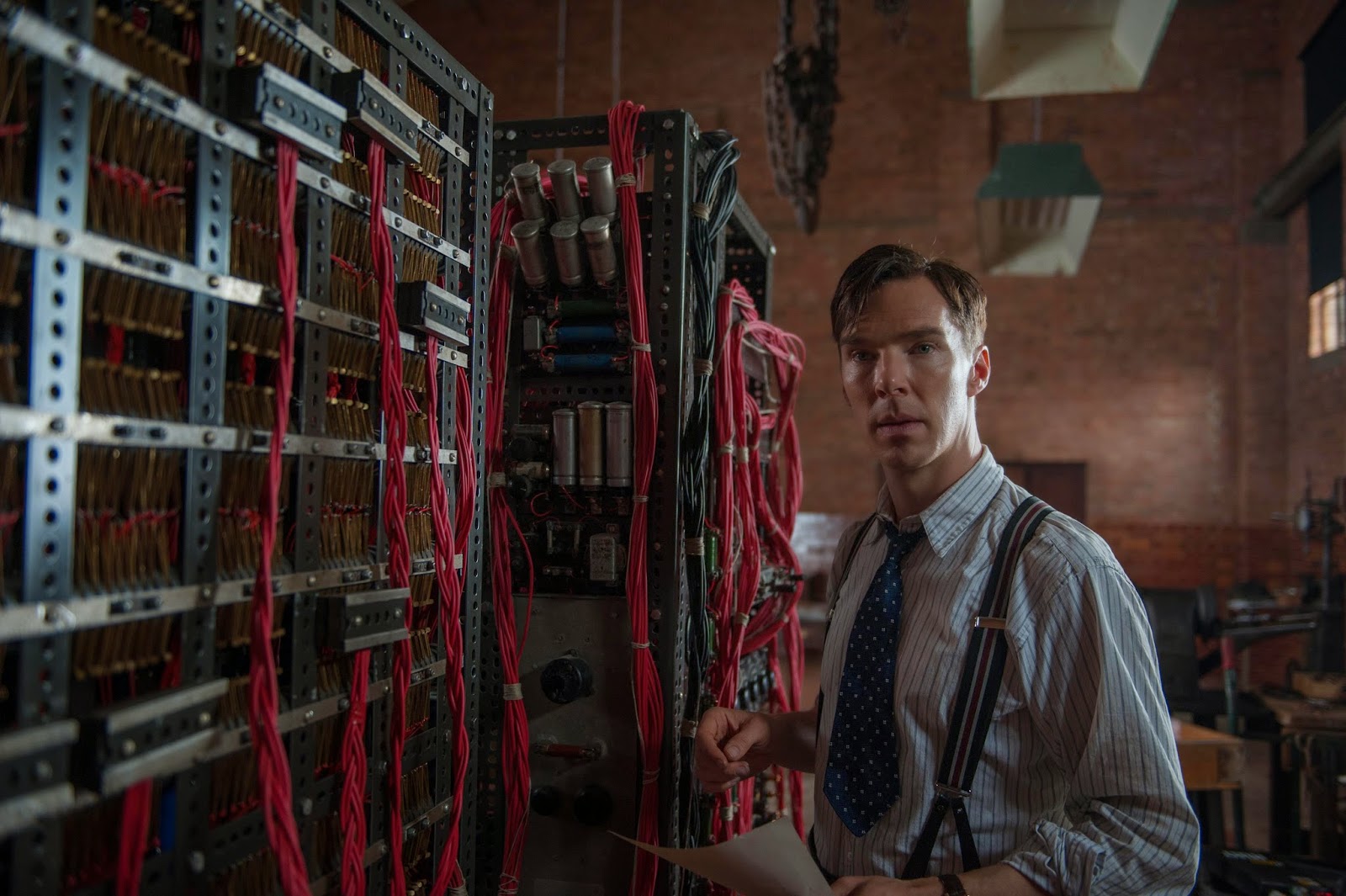REVIEW: THE IMITATION GAME
There's no better way to end the year of 2014, a very solid year for the cinema, than with a soon-to-be Oscar nominee and Golden Globe nominee for Best Drama: Morten Tyldum's The Imitation Game does not disappoint. With a strong trio giving awards-worthy performances, Benedict Cumberbatch, Keira Knightley and Matthew Goode star in this drama about socially awkward genius (is there any other type in the movies?) Alan Turing who not only prevented a lot of World War II casualties with his enormous code deciphering machine, but was a closeted homosexual who additionally had childhood bullies. Though it is a different type of pain inflicted on him, Turing suffered the amount of mental and emotional pain like Louie Zamperini suffered physical pain in Unbroken. This was not a man satisfied with the cards he was dealt, and Cumberbatch rarely smiles in the role.
 Out of the two British genius movies that are competing heavily for Oscar gold, The Imitation Game outsmarts The Theory of Everything by leagues (I fell asleep in that movie, that's why I didn't review it!). Though it doesn't stray too far from your typical biopic formula, there is some mystery and intrigue to it. Why is Alan Turing sitting in a room about to be interrogated in the beginning? The movie traces Turing's seemingly always tragic life. He's not as obnoxious as Sheldon in "The Big Bang Theory," but he doesn't have that character's sense of humor to pull off enough of a likeability for people to enjoy his company. At one point, Keira Knightley, playing fellow genius Joan Clarke, remarks about Turing's loneliness, and he says "I'm never alone." Factually this is a false statement, he is alone quite frequently, working on the machine that will help break the German Enigma code that he calls Christopher (you'll see why), eating lunch by himself, and so on. But I think he meant that he has become so used to the loneliness and isolation of the life he lives that he has grown accustom to it and doesn't mind it.
Out of the two British genius movies that are competing heavily for Oscar gold, The Imitation Game outsmarts The Theory of Everything by leagues (I fell asleep in that movie, that's why I didn't review it!). Though it doesn't stray too far from your typical biopic formula, there is some mystery and intrigue to it. Why is Alan Turing sitting in a room about to be interrogated in the beginning? The movie traces Turing's seemingly always tragic life. He's not as obnoxious as Sheldon in "The Big Bang Theory," but he doesn't have that character's sense of humor to pull off enough of a likeability for people to enjoy his company. At one point, Keira Knightley, playing fellow genius Joan Clarke, remarks about Turing's loneliness, and he says "I'm never alone." Factually this is a false statement, he is alone quite frequently, working on the machine that will help break the German Enigma code that he calls Christopher (you'll see why), eating lunch by himself, and so on. But I think he meant that he has become so used to the loneliness and isolation of the life he lives that he has grown accustom to it and doesn't mind it.
You can sense the fear in Cumberbatch when he sees an intimidating figure come up to him. There's no confidence in this stuttering man, he winces with fear and cries when things are taken from him. His whole life he's had to stuff down emotions, perhaps that's why Turing went to mathematics: they are a constant and unchanging factor of life. Knightley as Clarke is also an Oscar-nom caliber performance. One can tell she has an undying affection for the man who stood up for her when no one else would, because he knew what it was like to be in the minority. The greatest bit of dialogue, however, which will hopefully earn this movie an Adapted Screenplay nomination, was when Turing asks his interrogator who he thinks Turing is. It's a dialogue loaded with double meaning and tragic symbolism, and you won't find me complaining if Cumberbatch wins the Oscar.
That's right, expect a lot of nominations to come the way of director Morten Tyldum and his talented cast. The Imitation Game is like A Beautiful Mind had a more accessible protagonist and a sadder real-life ending. Though it's name will be mentioned so many times you may tire of it, go see it for yourself to experience great character and highly interesting real life behind the scenes war drama.
Rating: 3.5/4 stars
 Out of the two British genius movies that are competing heavily for Oscar gold, The Imitation Game outsmarts The Theory of Everything by leagues (I fell asleep in that movie, that's why I didn't review it!). Though it doesn't stray too far from your typical biopic formula, there is some mystery and intrigue to it. Why is Alan Turing sitting in a room about to be interrogated in the beginning? The movie traces Turing's seemingly always tragic life. He's not as obnoxious as Sheldon in "The Big Bang Theory," but he doesn't have that character's sense of humor to pull off enough of a likeability for people to enjoy his company. At one point, Keira Knightley, playing fellow genius Joan Clarke, remarks about Turing's loneliness, and he says "I'm never alone." Factually this is a false statement, he is alone quite frequently, working on the machine that will help break the German Enigma code that he calls Christopher (you'll see why), eating lunch by himself, and so on. But I think he meant that he has become so used to the loneliness and isolation of the life he lives that he has grown accustom to it and doesn't mind it.
Out of the two British genius movies that are competing heavily for Oscar gold, The Imitation Game outsmarts The Theory of Everything by leagues (I fell asleep in that movie, that's why I didn't review it!). Though it doesn't stray too far from your typical biopic formula, there is some mystery and intrigue to it. Why is Alan Turing sitting in a room about to be interrogated in the beginning? The movie traces Turing's seemingly always tragic life. He's not as obnoxious as Sheldon in "The Big Bang Theory," but he doesn't have that character's sense of humor to pull off enough of a likeability for people to enjoy his company. At one point, Keira Knightley, playing fellow genius Joan Clarke, remarks about Turing's loneliness, and he says "I'm never alone." Factually this is a false statement, he is alone quite frequently, working on the machine that will help break the German Enigma code that he calls Christopher (you'll see why), eating lunch by himself, and so on. But I think he meant that he has become so used to the loneliness and isolation of the life he lives that he has grown accustom to it and doesn't mind it.You can sense the fear in Cumberbatch when he sees an intimidating figure come up to him. There's no confidence in this stuttering man, he winces with fear and cries when things are taken from him. His whole life he's had to stuff down emotions, perhaps that's why Turing went to mathematics: they are a constant and unchanging factor of life. Knightley as Clarke is also an Oscar-nom caliber performance. One can tell she has an undying affection for the man who stood up for her when no one else would, because he knew what it was like to be in the minority. The greatest bit of dialogue, however, which will hopefully earn this movie an Adapted Screenplay nomination, was when Turing asks his interrogator who he thinks Turing is. It's a dialogue loaded with double meaning and tragic symbolism, and you won't find me complaining if Cumberbatch wins the Oscar.
That's right, expect a lot of nominations to come the way of director Morten Tyldum and his talented cast. The Imitation Game is like A Beautiful Mind had a more accessible protagonist and a sadder real-life ending. Though it's name will be mentioned so many times you may tire of it, go see it for yourself to experience great character and highly interesting real life behind the scenes war drama.
Rating: 3.5/4 stars



Comments
Post a Comment